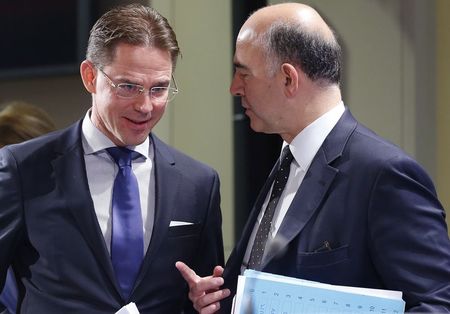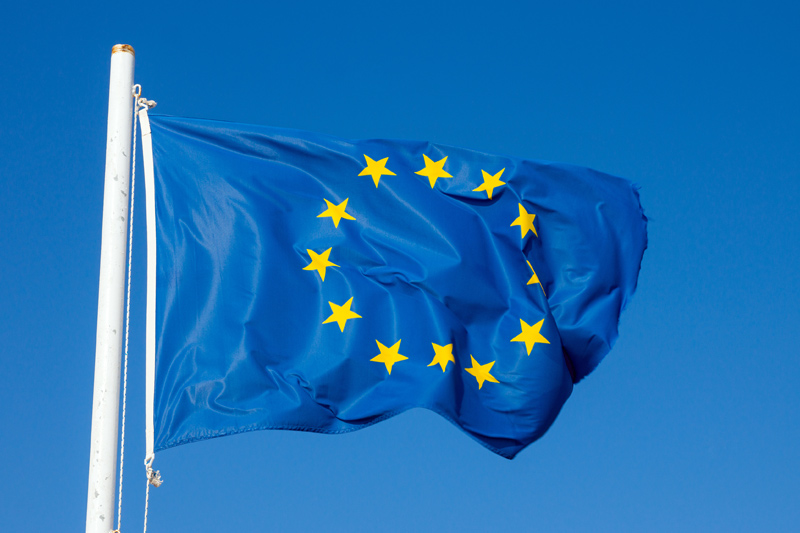By Robin Emmott
BRUSSELS (Reuters) - The euro zone will need another year to reach even a modest level of economic growth, the European Commission said on Tuesday, calling on Germany to help as Chancellor Angela Merkel again rejected a spending spree.
The EU executive cut its forecasts, saying the euro zone economy would expand by 0.8 percent this year, 1.1 percent next year and by 1.7 percent in 2016 -- a level the Commission said six months ago would be achieved next year. The delay in the upturn was due to drag on the economy from France and Italy.
"There is no single and simple answer. The economic recovery is clearly struggling to gather momentum," the EU's economics commissioner, Pierre Moscovici, told a news conference. Fellow European Commissioner Jyrki Katainen said Germany, Europe's biggest economy, should invest more to help the recovery.
Those calls were echoed by Italy's undersecretary for European Affairs, Sandro Gozi, who said the Commission's forecasts were proof that economic policies focusing heavily on budget rigor were misguided.
"Today's economic forecasts are good news because they confirm that the approach is wrong," Gozi said in Berlin.
German economic growth will be slower than the Commission had hoped, expanding 1.1 percent in 2015, not the 2 percent level the EU executive had foreseen in its Spring forecasts.
"Germany can play a significant role in stimulating the EU and euro area economy," said Katainen, who is the EU's new growth and jobs commissioner. "For the sake of Germany's own economic strength in the future, it makes sense to invest."
But he also said Germany alone would not be enough and that all EU countries needed to reform to boost growth.
Germany has become increasingly isolated for its insistence on balancing its budget, as the weakness of the 18-country euro zone, which generates a fifth of world economic output, holds back a broader global revival led by the United States.
German Chancellor Angela Merkel, speaking in Berlin to Germany's employers association, reiterated her concerns about getting deeper into debt, in what is becoming a repetitive debate on spending that divides the euro zone.
"Investment is needed but not with new borrowing," she said.
Germany is wary of the excessive spending that caused the euro zone's 2009-2012 banking and debt crisis, when the bloc lived far beyond its means and lost the confidence of markets.
The Commission forecasts Germany will post a budget surplus this year, a balanced budget in 2015 and another surplus in 2016, showing little appetite for more government spending.
FRENCH PROMISE
Indebted countries like Italy and France have little public money for investing, something that was highlighted by the Commission's Autumn projections for France's budget deficit.
Rather than falling, like virtually everywhere else in the euro zone, the French deficit is to grow steadily to 4.7 percent of gross domestic product in 2016 from 4.1 percent in 2013, assuming the country takes no further steps.
France has promised to bring the deficit down to the EU's 3 percent of GDP limit in 2017, but that is the year of a presidential election, making dramatic spending cuts unlikely.
Reacting to the Commission's overall forecasts, French Finance Minister Michel Sapin said in a statement issued to Reuters that the crucial question was "how to rediscover, as quickly as possible, more growth and jobs".
Euro zone leaders are putting their faith in a proposed 300 billion euro fund to invest in projects to revive the economy.
The European Commission's new president, Jean-Claude Juncker, has promised to unveil the plan in December, but economists warn the program will not be enough.
"Investment is still considerably lower than the level it was at before the crisis," said Moscovici. "This is not specific to the most vulnerable countries ... An acceleration of investment is essential."
DIRE INDICATORS
While the hangover from its banking and debt crises is largely to blame for the euro zone's fragility, tensions with Russia over Ukraine and economic sanctions imposed by the EU on Moscow have also damaged business confidence and exports.
The Commission data appears to avoid the relapse into recession that European Central Bank President Mario Draghi warned EU leaders of at a summit in Brussels last month, but despite a slowly improving trend, indicators remain dire.
Inflation will be 0.5 percent this year, 0.8 percent in 2015 and 1.5 percent in 2016, well below the target level of 2 percent the ECB judges as healthy for the economy, while unemployment is seen barely budging, at 10.8 percent in 2016.
The data is likely to support calls by economists and some investors for the ECB to embark on the kind of quantitative easing bond-buying program that Japan, Britain and the United States have employed to recover from the crisis.
But Draghi has told the euro zone it cannot just rely on the ECB, which is banned from directly financing governments, to help, and that countries must reform to get more young people into work and help carry the burden of an aging population.

Draghi said last month he wanted to see governments draw up a reform program by the next EU summit in December.
(Additional reporting by Yann Le Guernigou in Paris and Madeline Chambers, Erik Kirschbaum and Stephen Brown in Berlin; Editing by Catherine Evans)
